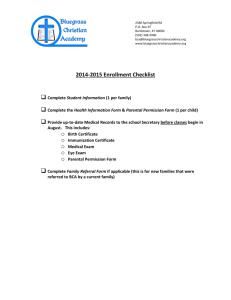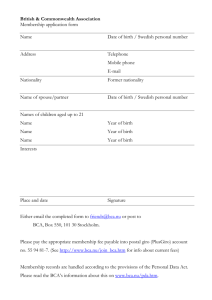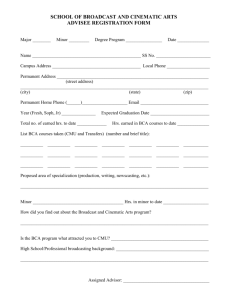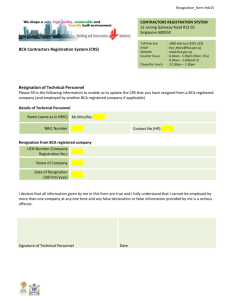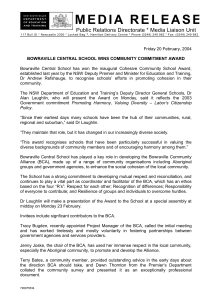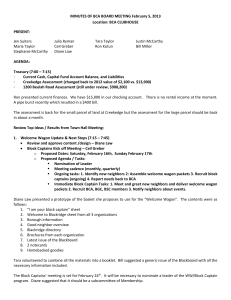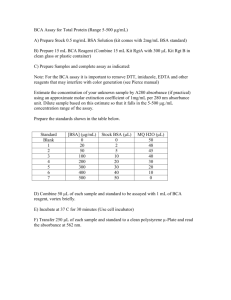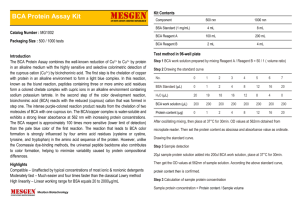BRANDERMILL COMMUNITY ASSOCIATION, INC. FINANCIAL
advertisement
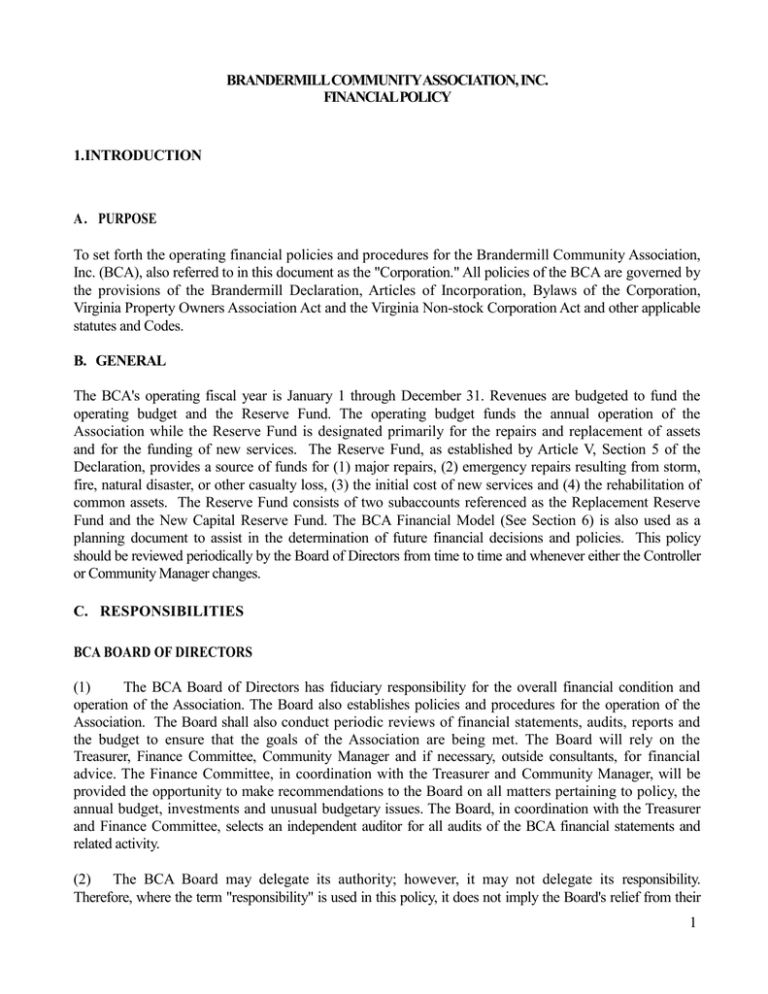
BRANDERMILL COMMUNITYASSOCIATION, INC. FINANCIAL POLICY 1.INTRODUCTION A. PURPOSE To set forth the operating financial policies and procedures for the Brandermill Community Association, Inc. (BCA), also referred to in this document as the "Corporation." All policies of the BCA are governed by the provisions of the Brandermill Declaration, Articles of Incorporation, Bylaws of the Corporation, Virginia Property Owners Association Act and the Virginia Non-stock Corporation Act and other applicable statutes and Codes. B. GENERAL The BCA's operating fiscal year is January 1 through December 31. Revenues are budgeted to fund the operating budget and the Reserve Fund. The operating budget funds the annual operation of the Association while the Reserve Fund is designated primarily for the repairs and replacement of assets and for the funding of new services. The Reserve Fund, as established by Article V, Section 5 of the Declaration, provides a source of funds for (1) major repairs, (2) emergency repairs resulting from storm, fire, natural disaster, or other casualty loss, (3) the initial cost of new services and (4) the rehabilitation of common assets. The Reserve Fund consists of two subaccounts referenced as the Replacement Reserve Fund and the New Capital Reserve Fund. The BCA Financial Model (See Section 6) is also used as a planning document to assist in the determination of future financial decisions and policies. This policy should be reviewed periodically by the Board of Directors from time to time and whenever either the Controller or Community Manager changes. C. RESPONSIBILITIES BCA BOARD OF DIRECTORS (1) The BCA Board of Directors has fiduciary responsibility for the overall financial condition and operation of the Association. The Board also establishes policies and procedures for the operation of the Association. The Board shall also conduct periodic reviews of financial statements, audits, reports and the budget to ensure that the goals of the Association are being met. The Board will rely on the Treasurer, Finance Committee, Community Manager and if necessary, outside consultants, for financial advice. The Finance Committee, in coordination with the Treasurer and Community Manager, will be provided the opportunity to make recommendations to the Board on all matters pertaining to policy, the annual budget, investments and unusual budgetary issues. The Board, in coordination with the Treasurer and Finance Committee, selects an independent auditor for all audits of the BCA financial statements and related activity. (2) The BCA Board may delegate its authority; however, it may not delegate its responsibility. Therefore, where the term "responsibility" is used in this policy, it does not imply the Board's relief from their 1 fiduciary duty or role, but rather describes the duties and authority of the applicable person(s) or entity, if specified. BCA TREASURER The BCA Treasurer is appointed by and responsible to the BCA Board of Directors. The Treasurer will accomplish the following duties: (1) Reviews monthly financial reports, etc. As a minimum, provides a quarterly report to the BCA Board on the current financial condition of the Association and significant budget variances. (2) Recommends financial policy and procedures. (3) Assists staff on financial matters as required. (4) Reviews federal income tax returns, audits, investments and other financial reports. (5) Meets with the auditor as required and as part of the annual audit process. (6) In coordination with the Finance Committee and Community Manager, formulates and recommends an investment strategy to be approved by the Board of Directors. (7) Serves as the Board's liaison and a non-voting member on the Finance Committee. (8) In coordination with the Community Manager and Controller conducts periodic reviews of the Association's insurance coverages and risk management program at least every three years and make recommendations to the BCA Board of Directors. COMMUNITY MANAGER The Community Manager reports to the BCA Board and is given authority over and responsibility for the administration, execution and management of the annual operating and Reserve Fund/capital projects budget and other aspects of financial management as specified below. These responsibilities include but are not limited to: (1) Coordinates and executes the annual Operating and Reserve Fund budget. Also, sets the rental rates and service charges for the various activities and programs sponsored by the Corporation. (2) Supervises accounting procedures and financial reports (includes submitting the Quarterly Financial Report at the end of each quarter). (3) Prepares for the annual audit. (4) Coordinates and executes contracts and bids. 2 (5) Manages all operating and Reserve Fund expenditures and projects. (6) Coordinates with the BCA Treasurer and Finance Committee. (7) Manages the Corporation's Risk Management Program. (See Section 8) (8) Manages the Corporation's Wage and Salary Program. All wage increases and salary/wage rates, will be in accordance with the Wage and Salary program, as approved by the BCA Board. Recommendations for the merit pool amount for employee salary/wage increases are made directly to the BCA Board and included and identified in the annual Operating Budget as a total percent of employer costs. (9) Manages each cost center in the annual budget as approved. Board oversight of the budget(s) will be exercised through the Treasurer's monthly review and the formal Quarterly Financial Report. Further, the Community Manager is authorized to manage the internal budget cost centers in order to meet the overall budget objectives. BCA Controller The BCA Controller reports to the Community Manager and is responsible for: (1) (2) Accounts Payable & Receivable. Delinquent Accounts. (3) Preparation for the Annual Audit and other audits. (4) Preparation of financial reports including preparation of the Quarterly Financial Report, updates to the BCA Financial Planning Model, and maintenance of Reserve Fund schedules, records, monthly statements, assessment reports, member lists, balance sheet, investment reports, risk management records and reports, routine service contracts and agreements, etc. (5) Assisting in the preparation of the annual budgets and monitors both the operating budget and Reserve Fund status and variances. (6) Preparation of information for federal and State income tax filings and other financial reports. (7) Payroll. (8) Petty Cash. (9) Special projects as directed by the Community Manager. BCA FINANCE COMMITTEE The BCA Finance Committee is appointed by and responsible to the Board and will assist the Treasurer and Community Manager. The Committee's role is advisory in nature and it meets periodically to: 3 (1) Assist the Treasurer and Board of Directors in selection of the independent auditor. (2) Review and prepare recommendations to the Board pertaining to the proposed annual and Reserve Fund budget, including annual assessment rates. operating (3) Review and prepare recommendations for input to the BCA Financial Model and annual Reserve Fund and capital projects schedule. (4) Periodically review the Corporation's Investment Policy with the Treasurer and Community Manager and make recommendations to the Board. (5) Review the annual audit prior to the auditor's presentation to the Board. (6) Review the Quarterly Financial Report including significant variances. (7) Review unbudgeted capital or unusual operating expenditures of the Corporation and report to the Board on their financial impact. The Finance Committee will have a revenue subcommittee to optimize BCA revenue and investment income. This subcommittee will include the Community Manager, Finance Chair, Treasurer and other association members with some investment experience who do not have any business relationship with the BCA. 2. ANNUAL OPERATING BUDGET & ASSESSMENTS A. BUDGET PROCESS The BCA Annual Budget process begins in May and will conclude no later than November 30. The BCA staff has the primary responsibility for its preparation. Committees requiring budget resources will be invited to contribute to its planning. Input from the Members will also be considered. The BCA Financial Model will be updated annually and used in the annual budget preparation along with the recommendations from Members, committees, the Treasurer, the Community Manager and the Board. The proposed budget will be reviewed by the Finance Committee and presented to the community by the Community Manager prior to its submission to the Board. The final proposed annual budget is submitted to the Board for approval by the Community Manager no later than the first week of November. Board approval of the Annual Budget, to include the Operating Budget and the Annual Reserve Fund/Capital Projects Budget is the necessary authority for the Community Manager to implement the Budget without further approval from the Board, including employee salary/wage increases. A consolidated Annual Budget will be published and posted no later than 30 days prior to the beginning of the new fiscal year. B. INCREASES IN THE MAXIMUM ANNUAL ASSESSMENT & THE ANNUAL ASSESSMENT (1) Article V, Covenants for Assessments, Section 2 and Section 3 of the Brandermill Declaration defines the purpose of the annual assessment and guidelines to be followed in establishing the maximum and actual annual increases in assessments. The actual increase in annual assessments, not to exceed the maximum amount specified in the above mentioned sections of the Declaration, will be established at an amount which ensures adequate funding of the annual operating and reserve fund budgets. Declaration of Covenants can be found at www. Brandermill.com or contact the BCA for a 4 copy. C. SPECIAL ASSESSMENTS Article V, Section 4 of the Brandermill Declaration provides that "in addition to the Annual Assessment, the Board of Directors may levy Special Assessments in accordance with the Code of Virginia (Virginia Property Owners Association Act) for the improvement, maintenance, enhancement, enlargement and operation of the Common Properties and to provide services which the Association is authorized to provide." D. APPLICATION OF ASSESSMENT LEVIES & INCREASES Article V, Section 3 (h) of the Brandermill Declaration provides that any increase in the Maximum Annual Assessment shall be made in such a manner that the proportionate increase in such assessment is the same for all Owners for all Units. Article V, Section 4, Special Assessments, provides that "the proportion of each Special Assessment to be paid by the Owner of the various classifications of assessable property shall be equal to the portion of the Annual Assessments made for the assessment year during which Special Assessments are approved." E. ANNUAL OPERATING BUDGET EXCESS OR DEFICIT Annual operating budget excesses, if any, will be applied in accordance with direction from the Board of Directors following consultation with the Controller, the Community Manager, the Treasurer and the Finance Committee. It is the policy of the BCA to provide adequate funds in order to ensure that all operating requirements are met. Funding of the Reserve Fund should be from specifically designated funds from the Operating Budget. However, should an Operating Budget deficit occur, the deficit may be funded from the funds budgeted for contribution to the New Capital Reserve Fund or the Board may levy a Special Assessment in accordance with the Declaration and Bylaws and the Virginia Property Owners Association Act. 3. REPLACEMENT CAPITAL RESERVE FUND A. PURPOSE The purposes of the Replacement Capital Reserve Fund are: (1) Major rehabilitation, (2) For emergency and other repairs required as a result of storm, fire, natural disaster, or other casualty loss, and (3) The cost for any capital improvement. For accounting and auditing purposes, any Reserve Fund expenditure approved by the Board must meet the tests as defined in the Declaration and those criteria used by the AICPA as generally accepted accounting principles. The expenditure of Reserve funds will be reviewed by the Finance Committee and approved by the Board. (2) Planned replacement of existing assets are identified in the Asset Replacement Schedule included in the Reserve Study (Section B below). Each project is analyzed based on merit, need, benefits, overall financial impact, and operational impact. Projects may be deferred, modified or eliminated by the Board. Any transfer of funds from the Replacement Reserve Fund to the Operating Budget must be approved by a vote of the BCA Board of Directors. 5 B. RESERVE STUDY As required by Section 55-514.1 of the Virginia Property Owners’ Act, the Board of Directors will initiate a study at least once every 5 years to determine the necessity and amount of reserves required to repair, replace and restore physical assets. This requirement will be fulfilled by retaining an independent, professionally certified firm to estimate the replacement costs, total useful life, and remaining useful life of the Corporation’s physical assets, with the assistance of the Community Manager and staff. These estimates and a recommended annual replacement schedule will be included in the Reserve Study report produced by the firm conducting the study. In addition, the Study will include a recommended annual budget for required Reserve Fund expenditures and an estimate of the annual contributions to the Reserve Fund required to support the planned replacement schedule. C. ANNUAL RESERVE FUND/CAPITAL PROJECTS BUDGET The asset replacement schedule included in the Reserve Study will be reviewed annually by the Community Manager and any adjustments needed to reflect current conditions will be made, reviewed with the Finance Committee and recommended to the Board of Directors for approval. D. PROJECT MANAGEMENT The Community Manager is responsible for ensuring that all projects are accomplished and has discretion to exceed each project's budget by 5%, if required, without Board approval. The expenditures of Reserve funds for unspecified new items or contingencies require review and approval by the Board. Periodic status reports on capital projects will be provided to the Board. 4. NEW CAPITAL RESERVE FUND A. PURPOSE Funds are dedicated to capital improvements that currently do not exist. Special or previously unplanned requirements or new services may be added as needed. Each project and service is analyzed based on merit, need, benefits, overall financial impact, and operational impact. Recommended projects and services may be deferred, modified or eliminated by the Board. Monies from this Fund may also be used to offset deficits in the Operating Budget, should such deficits occur. B. SOURCE Funding of the New Capital Reserve Fund is derived from the general Reserve Fund, and the maximum amount attributed to this Fund shall not exceed the fees obtained from purchasers of homes. A Brandermill homeowner who purchases and moves to another residence in Brandermill does not have to pay the fee. The annual contribution to the New Capital Fund may be adjusted annually by the BCA Board following consultation with the Controller, the Community Manager, the Treasurer and the Finance Committee. C. PROJECT MANAGEMENT The Community Manager is responsible for ensuring that all projects are accomplished and has discretion to exceed each project's budget by 5%, if required, without Board approval. The expenditures of Reserve funds for unspecified new items or contingencies require review and approval by the Board. Periodic status 6 reports on capital projects will be provided to the Board. 5. RECURRING REPORTS A. MONTHLY FINANCIAL REPORT The Controller will prepare a Monthly Income Statement and Balance Sheet for review by the Community Manager and Treasurer. The Monthly Report will also include a summary of all cash and investment accounts. B. QUARTERLY FINANCIAL REPORT The Quarterly Financial Report will be prepared quarterly and include explanations of significant variances as reflected in the Operating Budget Summary of Revenues and Expenses. A summary of all cash and investment accounts and Reserve Fund/Capital projects will also be included. The Quarterly Financial Report will be reviewed by the Treasurer and Finance Committee and then submitted to the BCA Board by the Treasurer and Community Manager. The combination of the Quarterly Financial Report and the Treasurer's review of the Monthly Financial Report provide appropriate assurance that the operating and capital budgets are being properly managed and implemented and where additional action or resources are required, appropriate steps can be taken by the Board. 6. BCA FINANCIAL PLANNING MODEL The BCA utilizes the BCA Financial Planning Model as a planning and strategic tool. The BCA will use this model as part of its annual budgeting process as well as to assist in forecasting the financial needs of the community. The Finance Committee will use the Financial Model as one of the economic considerations in developing its recommendations regarding assessments. The primary purpose of the Financial Planning Model is to ensure that the Reserve Fund will be properly funded and that sufficient financial resources are on hand to meet unexpected requirements. The Financial Planning Model consists of two (2) primary Schedules. A. SCHEDULE 1 Schedule 1 is a Five Year Operating Budget model of revenues and expenses, trended for inflation. B. SCHEDULE 2 Schedule 2 is The Brandermill Replacement Reserve Study (See Sections 3B and 3C above.) 7. INVESTMENT POLICY – The following Investment Policy was approved by Resolution of the Board on October 5, 2015. Insofar as each member of the Board of Directors is a fiduciary of the Association and is therefore required to discharge the responsibilities of a Director with good faith judgment of the best interests of the Corporation, and 7 Insofar as each Director is legally required to be guided by the Prudent Investors Rule when making investment decisions, and Insofar as the Code of Virginia allows for “Safe Harbor” Investments and Fiduciary Investments (Legal List) which encourages both preservation of principal and growth of capital, therefore: It is resolved: A that the Association funds shall be invested in such amounts as shall be authorized by the Board of Directors, and B that authorized investments shall be those in the Virginia Code, Section 64.2-1502, "Safe Harbor" Investments, and Section 2.2-4519, Fiduciary Investments (the Legal List) C that upon recommendation from the Finance Committee and the Treasurer, the Board of Directors shall authorize the hiring and replacing of an investment company, investment consultant, or investment manager, and D that all accounts, instruments, and other documentation of such investments shall be subject to the approval of, and may from time to time be amended by, the Board of Directors as appropriate, and they shall be reviewed at least annually. E that investments shall be guided by the following goals, listed in decreasing order of importance: 1. Safety of Principal: the long –term goal is safety of the Replacement Reserves . 2. Liquidity and accessibility: funds should be readily available for projected or unexpected expenditures. 3. Minimal costs: investment costs (redemption fees, commissions and other transaction costs) should be minimized. 4. Professional Management: funds should be invested with professional managers who have good reputations and sound credentials. 5. Return: funds should be invested to seek the highest level of return that is consistent with preservation of the purchasing power of the principal and accumulated interest. F that this Investment Policy of October 5, 2015, supersedes all previous Investment Policies adopted by the Board of Directors of the Brandermill Community Association. 8. CONTRACTS AND BIDS A. AUTHORIZATION The Community Manager is authorized to solicit, accept, contract and order services and goods for the purpose of accomplishing the goals of the Association, as established by the Board. 8 B. BID PROCESS (1) All contracts/projects over $10,000 require three written bids. All contracts/ projects between $3,500 and $10,000 require three written estimates. The BCA Board as requested by the community manager may waiver the three bid requirement for a project over $10,000 on a project by project basis. The written bids and estimates will be retained for three years. (2) Generally the lowest bid will be accepted providing the required standards and quality of work are assured. The Community Manager is authorized to make decisions on all project estimates less than $5000. Projects costing $5000 or more will be approved by the BCA Board of Directors in coordination with the Community Manager. (3) All outside contractors are required to provide a current Certificate of Insurance. C. REQUESTS FOR PROPOSALS Requests for Proposals (RFP) will be prepared by the Community Manager, using outside expertise when necessary. RFPs will include a general description and scope of work to be performed, performance standards and specifications, contractor qualifications and references, contractor financial information and conflict of interests disclosure (if applicable), insurance requirements, specific restrictions and limitations imposed as part of the work and contract, conditions of BCA acceptance of the bid, termination clause and dispute resolution procedures (if applicable). 9. RISK MANAGEMENT (1) The Association will be insured against possible theft, fraud, forgery, liability claims, property loss or damage. BCA insurance coverage shall include: (A) Directors and Officers Liability, (B) General Liability and Umbrella coverage, (C) Property Loss for all locations, (D) Automobile, (E) Comprehensive Crime (dishonesty) and (F) Workman's Compensation. (2) The Community Manager is responsible for the management of the Risk Management Program and will conduct periodic safety inspections of BCA facilities and training of all BCA personnel. NOTE: All insurance policies have deductibles (except Workman's Compensation). Policies are maintained in the BCA Office and are subject to periodic review and change. 10. PROTECTION AND INTERNAL CONTROLS A. USE AND SALE OF BCA ASSETS (1) Personal Use Statement of Scope The BCA assets and related expenditures are for the improvement and maintenance of the Brandermill Community. Personal use of the BCA assets by employees, directors, officers, committee members, and members of the Association is prohibited. Prohibited actions include charging personal expenses to the BCA, use of BCA assets (vehicles, lawn equipment, office equipment) for personal activities, use of BCA employees on non-BCA projects (IE, personal home/lawn care) and loans to BCA employees, 9 directors, officers, committee members, and members of the Association. (2) Exclusions Incidental personal use of the BCA computer assets (e-mail, internet), local telephone and fax machine use is allowed. This personal use must create a negligible cost to the BCA and not interfere with the BCA employee’s work duties. (3) Disposal of BCA Assets If the community manager decides to sell a BCA asset, the following process will apply: The Treasurer must give prior approval of the sale of any BCA asset valued over $500 (the sale of any asset valued over $2,500 must receive the approval of the Board). It must be advertised on the BCA website, included in two weekly newsletters and in one issue of the Village Mill for at least two weeks prior to completing the sale. Written offers will be received at the BCA office through the closing date. This sale transaction will be awarded to the highest bidder and must be paid in full at the time of the sale. No notes and/or loans are allowed to fund these purchases. (4) Monitoring Compliance with Policies Compliance with this policy will be monitored by BCA Officers with oversight from the BCA Finance Committee assisted by the external audit firm. B. AUDITS The BCA Board shall require annual and special audits, as required. Special reviews or reconciliations may also be done, if needed. The results of all audits, reviews and reconciliations shall be published and made available to the Members upon request. A report on the Annual Audit, or any other audit, will be reviewed with the Finance Committee and then presented by the independent auditing firm to the Board. C. CHECK SIGNING AUTHORITY No check signer can sign a check payable to that signee. All nonrecurring expenses over $10,000 require two signatures. The following BCA directors and officers are authorized to sign checks in the following order: 1) Community Manager 2) Treasurer 3) President 4) 1st Vice President The Treasurer must verbally approve all check signatures by the President and Vice President. D. ACTING COMMUNITY MANAGER Should the Community Manager become unavailable due to an extended absence such as disability, illness, resignation, etc., the following actions shall be taken: 10 (1) The President and Treasurer shall be notified of any absence of the Community Manager. If there is an expected or unexpected prolonged absence, the President shall be authorized to appoint an Acting Community Manager until such time as the Board can convene to confirm or appoint an Acting Community Manager and/or decide to employ another Community Manager. (2) The Acting Community Manager will be authorized to act on behalf of the Community Manager on routine daily matters. Unless otherwise specified, all decisions regarding check signing of any amount, investments, capital funds, major operating purchases, contracts, claims, risk management, budgetary matters, policy matters, employment, salaries, wages and benefits shall be made by the President in coordination with the Treasurer. If the President is not available, then the First Vice-President, then the Second Vice-President, in coordination with the Treasurer. (3) The President, then any officer of the Board, in coordination with the Treasurer, shall also be authorized to sign checks and/or approve budgeted and unbudgeted expenditures when justified, or for emergency needs that may occur. (4) Any purchase order (PO) request that exceeds the established departmental restrictions must be approved and signed by an officer of the Board prior to any purchase or commitment of funds. (5) At the discretion of the BCA Board, a special audit or review by the Corporation's independent auditor may be done upon the departure of the Community Manager or Controller. E. CASH DEPOSITS Cash deposits will be made on a timely basis with the goal that all funds be deposited the next business day after receipt. F. PETTY CASH The amount of petty cash in the office will not exceed $300. Petty cash payments must be approved by the Community Manager or in his or her absence, the Controller. The cash box shall always equal $300 in the form of cash and receipts. G. Department Head Spending Limits: Controller - $1,000 Administrative Assistant - $250 Property Management - $250 Community Services - $250 Director of Maintenance - $1,000 11 H. ACCOUNTS PAYABLE INVOICES AND RECEIPTS (1) All invoices and receipts will be submitted to the Controller within two (2) business days upon receipt. All non recurring invoices and all receipts will have department head's signature and explanation of expenditure. The Controller will ensure that the proper account classification is coded on the invoice. A copy of the winning bid /estimate will be attached to the invoice. (2) Checks will be written as required taking advantage of any discounts and forwarded to the Community Manager. I. BCA CREDIT CARDS BCA Credit cards may be assigned to the Community Manager, Controller and the Maintenance Manager. All other credit cards will be controlled by the Controller. J. TRAVEL AND EXPENSE REIMBURSEMENT All travel, meetings and mileage reimbursements, and miscellaneous expense reimbursements must be reported on the BCA Expense Report Form and turned into the accounting department monthly. All overnight travel and expense reports and mileage claims for reimbursement must be approved by the Community Manager. 11. ACCOUNTS RECEIVABLE A. (1) BILLING Assessments Assessments may be paid by credit card, check or money order. Cash may be accepted but is discouraged. Cash payments should be handled by the Controller or Accounting Assistant and a complete record made of the payment including a receipt given to the person making payment. Third party checks will not be accepted. Assessments are billed on the 1st day of the first month of each quarter (January, April, July, October) and are due in full by the 25th day of the billing month. The Board of Directors has the right to determine the billing schedule or utilize a billing agent as set forth in Article V, Section 3(b), of the Brandermill Declaration. Assessments are due in full by the 25th day of the billing month. (a) Finance Charges If the assessment is not paid as of the 25th day of the billing month, the assessment shall become delinquent and a finance charge will be assessed at the rate determined by the Board of Directors, not to exceed the maximum allowable by law and in accordance with Article V, Section 8, of the Brandermill Declaration. The current finance charge is .50% per month or 6% annually of the delinquent assessment amount, however, these rates are subject to change by the BCA Board. 12 (b) Late Payment Penalty If the assessment is not paid by the 25th day of the billing month, the assessment shall become delinquent and a late payment penalty will be assessed. This penalty shall not exceed the maximum allowable by law and must be in accordance with Article V, Section 8, of the Brandermill Declaration. The current late payment penalty amount is 10% of the total delinquent assessment amount and can only be charged on each quarterly amount due. (2) Violation Charges Violation charges are billed monthly and are treated as assessments for the purpose of collection, in accordance with Chapter 26, Section 55-513, paragraph B of the Code of Virginia. Violation charges will become delinquent the last day of the billing month and are subject to finance and late charges as outlined above for assessments. (3) Advertising Advertisers are billed monthly for advertising in that issue. Payment in full is due in thirty days.(Net 30). Advertisers in the Telephone Directory will pay in full when the contract is submitted, unless billing arrangements have been made. If billing arrangements have been made, the advertiser will be billed and payment is due in 30 days. Accounts that are over 30 days past due will be assessed a finance charge each month and will become delinquent and are subject to collection proceedings, as outlined in the advertising contract. (4) Miscellaneous All miscellaneous charges, such as Sunday Park Loop Road Maintenance, Storage, Boat Registration, marina rentals, etc., are due 30 days from billing date. All accounts that are over 30 days past due are subject to finance charges and late payment penalty fees as stated above for assessments. B. MONTHLY STATEMENTS Monthly statements will be sent to all delinquent accounts reflecting the amount owed, including any finance charges, late payment penalties, violation charges and miscellaneous charges. C. (1) COLLECTION OF DELINQUENT ACCOUNTS, NOTICES & LIENS Assessments, Violation and Miscellaneous Charges Assessments are billed on the first day of each quarter (January, April July and October). Assessments are due in full by the 25th day of the first month of each quarter. Assessment accounts not paid in full by the 25th day of the billed quarter are considered as delinquent accounts. Late charges and interest will be included as part of the total delinquent assessment amount. Statements are sent monthly to all past due accounts. 13 (2) Delinquent Assessment Notices and Liens: Second Statement-2nd month of quarter A past due statement for all delinquent assessment accounts (annual and special assessments) will be billed on the first day of the month immediately following the account becoming delinquent. Both a late fee and finance charge are applied. Assessment accounts that remain delinquent more than 60 days after the first of the quarter will receive a third notice of delinquency (past due statement )and another finance charge is applied. . A letter is sent stating that the account is going to be sent to the collection attorney with the third statement of the quarter. Part of the attorney’s collection process will include placement of a judgment/lien against the delinquent property. (3) Acceleration of obligation to pay assessments: Upon the filing of a lien for a. delinquent assessment account as defined herein, the BCA shall be entitled to demand and accelerate full payment of the remaining annual assessments (including any special assessment approved after January 2000) owed for the current fiscal year and to include that, amount in addition to the delinquent amount owed as part of any lien filed. Acceleration of the annual assessment (including special assessments) payment will be taken if the assessment account has remained delinquent for two consecutive quarters or if the account has shown a consistent delinquent history and remains delinquent as described above. The BCA Board of Directors will approve the acceleration of the annual assessment or special assessment for a property owner prior to such action being taken. No action taken described in this policy or implied, shall limit or restrict the BCA's authority to take other legal remedies at its disposal to satisfy any delinquent account, including collection and judgment actions as permitted by law. Any legal fees, including court costs and other fees and charges incurred by the BCA as a result of a delinquency, shall be the sole and full responsibility of the property owner (s). (4) Advertising Receivables All accounts that are delinquent for 60 days may be forwarded to the BCA attorney for collection. The lien filing fee shall also be added to the total lien amount: Any legal fees including court costs and other fees and charges incurred by the BCA shall be the full and sole responsibility of the delinquent person, advertiser or business, or firm. 14 12. DISCLOSURE INFORMATION PACKETS Pursuant to Chapter 26, Section 55-512 of the Virginia Property Owners Association Act, a Disclosure Packet will be made available by the Brandermill Community Association upon receipt of the Request For Disclosure Packet & Common Charge Statement Form with Section A completed in full by the seller or his/her agent or attorney and payment of the administrative disclosure processing fee. The administrative disclosure processing fee amount is set by the BCA in accordance with the provisions of the Virginia Property Owners Act. Upon receipt of the request form and payment of the administrative disclosure fee, Disclosure Packets will be prepared and coordinated for completion by the Administrative Assistant, or his/her designee. The Property Management Department will conduct an inspection of the property and a report of any violation of the restrictive covenants will be recorded as part of the Disclosure Packet. The Accounting Department and the Director of Community Services are also required to complete their portion of the Disclosure Form. Any funds due the BCA will be recorded and arrangements made for their payment by the Accounting Department. The Community Manager will review and sign all Disclosure Packets prior to their release. Note: This policy may be amended or modified at the discretion of the BCA Board of Directors and will be reviewed annually by the Community Manager, Controller, Finance Committee and Treasurer and at least every three (3) years by the BCA Board of Directors. Adopted: October 5, 2015 15
